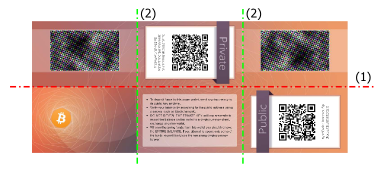MOVE your mouse around to add some extra randomness...
OR type some random characters into this textbox
You may skip this step if you do not plan to use the random key generator.
Step 0. Follow the security checklist recommendation
First step is to download this website from Github and open the index.html file directly from your computer. It's just too easy to sneak some evil code in the 6000+ lines of javascript to leak your private key, and you don't want to see your fund stolen. Code version control make it much easier to cross-check what actually run. For extra security, unplug your Internet access while generating your wallet.
Step 1. Generate new address
Choose your currency and click on the "Generate new address" button.
Step 2. Print the Paper Wallet
Click the Paper Wallet tab and print the page on high quality setting. Never save the page as a PDF file to print it later since a file is more likely to be hacked than a piece of paper.
Step 3. Fold the Paper Wallet
Fold your new Paper wallet following the lines.

You can insert one side inside the other to lock the wallet.
Step 4. Share your public address
Use your public address to receive money from other crypto-currency users. You can share your public address as much as you want.
Step 5. Keep your private key secret
The private key is literally the keys to your coins, if someone was to obtain it, they could withdraw the funds currently in the wallet, and any funds that might be deposited in that wallet.
Please test spending a small amount before receiving any large payments.

- Are you using a secure operating system guaranteed to be free of spyware and viruses, for example, an Ubuntu LiveCD?
Frequently asked questions :
• Is it safe ?
We try to make it that way ! The core of the tool, that generate the keys is 99% the same as the well reviewed bitaddress.org. We only changed it to be able to generate addresses for different crypto-currencies.
We think that having a unique generator for multiple currencies lead to a much better reviewed tool for all than having a myriad of half-backed generators. Changes made to this generator are available on Github in small and divided commits and those are easy to review and reuse. Walletgenerator.net use the same security measures as the original project. All-in-one html document, no ajax, no analytics, no external calls, no CDN that can inject anything they want. And trust us, we have seen some nasty things when reviewing some wallet generator.
• Why should I use a paper wallet ?
Advantages of a paper wallet are multiple:
⇒ They are not subject to malwares and keyloggers
⇒ You don’t rely on a third party’s honesty or capacity to protect your coins
⇒ You won't lose your coins when your device break
• How to use a paper wallet ?
Once you have generated and printed a wallet, you can send coins to the public address, like for any wallet. Store your paper wallet securely. It contains everything that is needed to spend your funds. Consider using BIP38 to secure your paper wallet with a password.
• How to spend the coins stored in a paper wallet ?
You will need to import your private key in a real client, that you can download from the currency website. The exact method to do that will depend on the client. If there is no integrated method, you can usually fall back to the debug console and use the command “importprivkey [yourprivatekey]“.
OR
Scan QR code using your camera
Permission denied. Your browser should display a message requesting access to your camera. Please click the "Allow" button to enable the camera.
51 characters Base58
52 characters Base58

